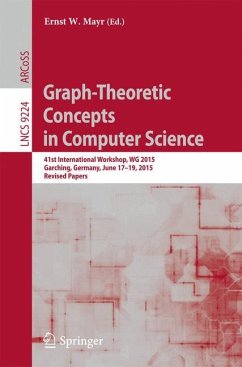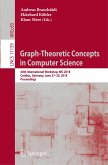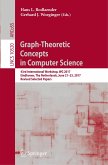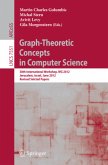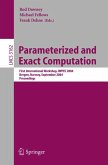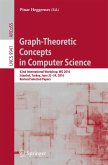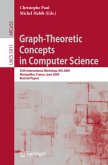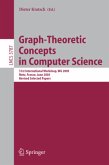Graph-Theoretic Concepts in Computer Science
41st International Workshop, WG 2015, Garching, Germany, June 17-19, 2015, Revised Papers
Herausgegeben:Mayr, Ernst W.
Graph-Theoretic Concepts in Computer Science
41st International Workshop, WG 2015, Garching, Germany, June 17-19, 2015, Revised Papers
Herausgegeben:Mayr, Ernst W.
- Broschiertes Buch
- Merkliste
- Auf die Merkliste
- Bewerten Bewerten
- Teilen
- Produkt teilen
- Produkterinnerung
- Produkterinnerung
This book constitutes revised selected papers from the 41st International Workshop on Graph-Theoretic Concepts in Computer Science, WG 2015, held in Garching, Germany, in June 2015. The 32 papers presented in this volume were carefully reviewed and selected from 79 submissions. They were organized in topical sections named: invited talks; computational complexity; design and analysis; computational geometry; structural graph theory; graph drawing; and fixed parameter tractability.
Andere Kunden interessierten sich auch für
![Graph-Theoretic Concepts in Computer Science Graph-Theoretic Concepts in Computer Science]() Graph-Theoretic Concepts in Computer Science39,99 €
Graph-Theoretic Concepts in Computer Science39,99 €![Graph-Theoretic Concepts in Computer Science Graph-Theoretic Concepts in Computer Science]() Graph-Theoretic Concepts in Computer Science39,99 €
Graph-Theoretic Concepts in Computer Science39,99 €![Graph-Theoretic Concepts in Computer Science Graph-Theoretic Concepts in Computer Science]() Graph-Theoretic Concepts in Computer Science39,99 €
Graph-Theoretic Concepts in Computer Science39,99 €![Parameterized and Exact Computation Parameterized and Exact Computation]() Frank Dehne / Rod Downey / Michael Fellows (eds.)Parameterized and Exact Computation41,99 €
Frank Dehne / Rod Downey / Michael Fellows (eds.)Parameterized and Exact Computation41,99 €![Graph-Theoretic Concepts in Computer Science Graph-Theoretic Concepts in Computer Science]() Graph-Theoretic Concepts in Computer Science39,99 €
Graph-Theoretic Concepts in Computer Science39,99 €![Graph-Theoretic Concepts in Computer Science Graph-Theoretic Concepts in Computer Science]() Graph-Theoretic Concepts in Computer Science40,99 €
Graph-Theoretic Concepts in Computer Science40,99 €![Graph-Theoretic Concepts in Computer Science Graph-Theoretic Concepts in Computer Science]() Dieter Kratsch (ed.)Graph-Theoretic Concepts in Computer Science41,99 €
Dieter Kratsch (ed.)Graph-Theoretic Concepts in Computer Science41,99 €-
-
-
This book constitutes revised selected papers from the 41st International Workshop on Graph-Theoretic Concepts in Computer Science, WG 2015, held in Garching, Germany, in June 2015.
The 32 papers presented in this volume were carefully reviewed and selected from 79 submissions. They were organized in topical sections named: invited talks; computational complexity; design and analysis; computational geometry; structural graph theory; graph drawing; and fixed parameter tractability.
The 32 papers presented in this volume were carefully reviewed and selected from 79 submissions. They were organized in topical sections named: invited talks; computational complexity; design and analysis; computational geometry; structural graph theory; graph drawing; and fixed parameter tractability.
Produktdetails
- Produktdetails
- Theoretical Computer Science and General Issues 9224
- Verlag: Springer / Springer Berlin Heidelberg / Springer, Berlin
- Artikelnr. des Verlages: 978-3-662-53173-0
- 1st ed. 2016
- Seitenzahl: 528
- Erscheinungstermin: 5. August 2016
- Englisch
- Abmessung: 235mm x 155mm x 29mm
- Gewicht: 816g
- ISBN-13: 9783662531730
- ISBN-10: 3662531739
- Artikelnr.: 45335272
- Herstellerkennzeichnung Die Herstellerinformationen sind derzeit nicht verfügbar.
- Theoretical Computer Science and General Issues 9224
- Verlag: Springer / Springer Berlin Heidelberg / Springer, Berlin
- Artikelnr. des Verlages: 978-3-662-53173-0
- 1st ed. 2016
- Seitenzahl: 528
- Erscheinungstermin: 5. August 2016
- Englisch
- Abmessung: 235mm x 155mm x 29mm
- Gewicht: 816g
- ISBN-13: 9783662531730
- ISBN-10: 3662531739
- Artikelnr.: 45335272
- Herstellerkennzeichnung Die Herstellerinformationen sind derzeit nicht verfügbar.
Invited Talks.- Parameterized Algorithmics for Graph Modification Problems: On Interactions with Heuristics.- Open Problems on Graph Coloring for Special Graph Classes.- On the Complexity of Approximation and Online Scheduling Problems with Applications to Optical Networks.- Computational Complexity.- The Stable Fixtures Problem with Payments.- Complexity of Secure Sets.- Efficient Domination for Some Subclasses of P6-free Graphs in Polynomial Time.- On the Tree Search Problem with Non-uniform Costs.- An O(n2) Time Algorithm for the Minimal Permutation Completion Problem.- On the Number of Minimal Separators in Graphs.- Efficient Farthest-Point Queries in Two-terminal Series-parallel Networks.- A Polynomial Delay Algorithm for Enumerating Minimal Dominating Sets in Chordal Graphs.- Finding Paths in Grids with Forbidden Transitions.- The Maximum Time of 2-neighbour Bootstrap Percolation in Grid Graphs and Parametrized Results.- Design and Analysis.- Minimum Eccentricity Shortest Paths in Some Structured Graph Classes.- Approximating Source Location and Star Survivable Network Problems.- On the Complexity of Computing the k-restricted Edge-connectivity of a Graph.- Computational Geometry.- Weak Unit Disk and Interval Representation of Graphs.- Simultaneous Visibility Representations of Plane st-graphs Using L-shapes.- An Abstract Approach to Polychromatic Coloring: Shallow Hitting Sets in ABA-free Hypergraphs and Pseudohalfplanes.- Unsplittable Coverings in the Plane.- Structural Graph Theory.- Induced Minor Free Graphs: Isomorphism and Clique-width.- On the Complexity of Probe and Sandwich Problems for Generalized Threshold Graphs.- Colouring and Covering Nowhere Dense Graphs.- Parity Linkage and the Erdös-Pósa Property of Odd Cycles Through Prescribed Vertices in Highly Connected Graphs.- Well-quasi-ordering Does Not Imply Bounded Clique-width.- A Slice Theoretic Approach for Embedding Problems on Digraphs.- Decomposition Theorems for Square-free 2-matchings in Bipartite Graphs.- Graph Drawing.- Saturated Simple and 2-simple Topological Graphs with Few Edges.- Testing Full Outer-2-planarity in Linear Time.- Fixed Parameter Tractability.- Triangulating Planar Graphs While Keeping the Pathwidth Small.- Polynomial Kernelization for Removing Induced Claws and Diamonds.- Algorithms and Complexity for Metric Dimension and Location-domination on Interval and Permutation Graphs.- On Structural Parameterizations of Hitting Set: Hitting Paths in Graphs Using 2-SAT.- Recognizing k-equistable Graphs in FPT Time.- Beyond Classes of Graphs with Few" Minimal Separators: FPT.- Results Through Potential Maximal Cliques.
Invited Talks.- Parameterized Algorithmics for Graph Modification Problems: On Interactions with Heuristics.- Open Problems on Graph Coloring for Special Graph Classes.- On the Complexity of Approximation and Online Scheduling Problems with Applications to Optical Networks.- Computational Complexity.- The Stable Fixtures Problem with Payments.- Complexity of Secure Sets.- Efficient Domination for Some Subclasses of P6-free Graphs in Polynomial Time.- On the Tree Search Problem with Non-uniform Costs.- An O(n2) Time Algorithm for the Minimal Permutation Completion Problem.- On the Number of Minimal Separators in Graphs.- Efficient Farthest-Point Queries in Two-terminal Series-parallel Networks.- A Polynomial Delay Algorithm for Enumerating Minimal Dominating Sets in Chordal Graphs.- Finding Paths in Grids with Forbidden Transitions.- The Maximum Time of 2-neighbour Bootstrap Percolation in Grid Graphs and Parametrized Results.- Design and Analysis.- Minimum Eccentricity Shortest Paths in Some Structured Graph Classes.- Approximating Source Location and Star Survivable Network Problems.- On the Complexity of Computing the k-restricted Edge-connectivity of a Graph.- Computational Geometry.- Weak Unit Disk and Interval Representation of Graphs.- Simultaneous Visibility Representations of Plane st-graphs Using L-shapes.- An Abstract Approach to Polychromatic Coloring: Shallow Hitting Sets in ABA-free Hypergraphs and Pseudohalfplanes.- Unsplittable Coverings in the Plane.- Structural Graph Theory.- Induced Minor Free Graphs: Isomorphism and Clique-width.- On the Complexity of Probe and Sandwich Problems for Generalized Threshold Graphs.- Colouring and Covering Nowhere Dense Graphs.- Parity Linkage and the Erdös-Pósa Property of Odd Cycles Through Prescribed Vertices in Highly Connected Graphs.- Well-quasi-ordering Does Not Imply Bounded Clique-width.- A Slice Theoretic Approach for Embedding Problems on Digraphs.- Decomposition Theorems for Square-free 2-matchings in Bipartite Graphs.- Graph Drawing.- Saturated Simple and 2-simple Topological Graphs with Few Edges.- Testing Full Outer-2-planarity in Linear Time.- Fixed Parameter Tractability.- Triangulating Planar Graphs While Keeping the Pathwidth Small.- Polynomial Kernelization for Removing Induced Claws and Diamonds.- Algorithms and Complexity for Metric Dimension and Location-domination on Interval and Permutation Graphs.- On Structural Parameterizations of Hitting Set: Hitting Paths in Graphs Using 2-SAT.- Recognizing k-equistable Graphs in FPT Time.- Beyond Classes of Graphs with Few" Minimal Separators: FPT.- Results Through Potential Maximal Cliques.

